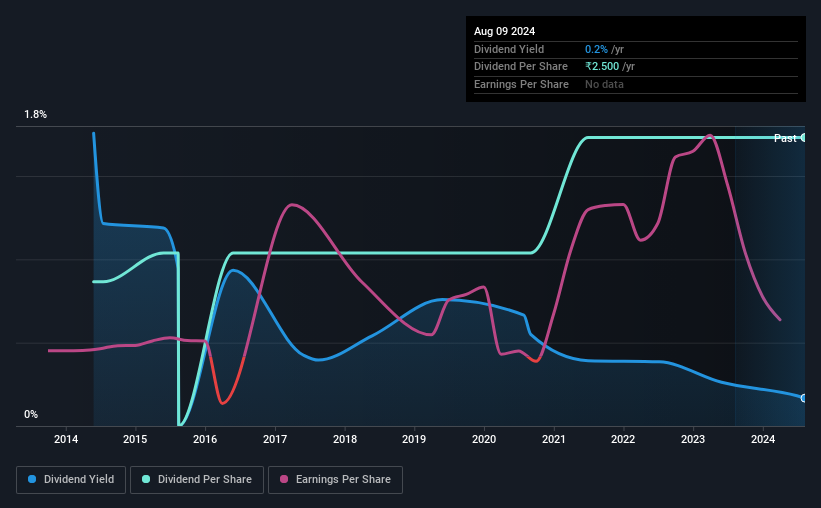Regular readers will know that we love our dividends at Simply Wall St, which is why it’s exciting to see Dhunseri Investments Limited (NSE:DHUNINV) is about to trade ex-dividend in the next three days. The ex-dividend date is one business day before the record date, which is the cut-off date for shareholders to be present on the company’s books to be eligible for a dividend payment. The ex-dividend date is important as the process of settlement involves two full business days. So if you miss that date, you would not show up on the company’s books on the record date. Meaning, you will need to purchase Dhunseri Investments’ shares before the 14th of August to receive the dividend, which will be paid on the 21st of September.
The company’s next dividend payment will be ₹2.50 per share, and in the last 12 months, the company paid a total of ₹2.50 per share. Last year’s total dividend payments show that Dhunseri Investments has a trailing yield of 0.2% on the current share price of ₹1495.05. Dividends are an important source of income to many shareholders, but the health of the business is crucial to maintaining those dividends. As a result, readers should always check whether Dhunseri Investments has been able to grow its dividends, or if the dividend might be cut.
Check out our latest analysis for Dhunseri Investments
Dividends are usually paid out of company profits, so if a company pays out more than it earned then its dividend is usually at greater risk of being cut. Dhunseri Investments is paying out just 3.1% of its profit after tax, which is comfortably low and leaves plenty of breathing room in the case of adverse events.
Companies that pay out less in dividends than they earn in profits generally have more sustainable dividends. The lower the payout ratio, the more wiggle room the business has before it could be forced to cut the dividend.
Click here to see how much of its profit Dhunseri Investments paid out over the last 12 months.

Have Earnings And Dividends Been Growing?
Stocks in companies that generate sustainable earnings growth often make the best dividend prospects, as it is easier to lift the dividend when earnings are rising. Investors love dividends, so if earnings fall and the dividend is reduced, expect a stock to be sold off heavily at the same time. Fortunately for readers, Dhunseri Investments’s earnings per share have been growing at 11% a year for the past five years.
The main way most investors will assess a company’s dividend prospects is by checking the historical rate of dividend growth. In the last 10 years, Dhunseri Investments has lifted its dividend by approximately 7.2% a year on average. It’s encouraging to see the company lifting dividends while earnings are growing, suggesting at least some corporate interest in rewarding shareholders.
Final Takeaway
Should investors buy Dhunseri Investments for the upcoming dividend? Typically, companies that are growing rapidly and paying out a low fraction of earnings are keeping the profits for reinvestment in the business. Perhaps even more importantly – this can sometimes signal management is focused on the long term future of the business. Overall, Dhunseri Investments looks like a promising dividend stock in this analysis, and we think it would be worth investigating further.
While it’s tempting to invest in Dhunseri Investments for the dividends alone, you should always be mindful of the risks involved. To help with this, we’ve discovered 1 warning sign for Dhunseri Investments that you should be aware of before investing in their shares.
A common investing mistake is buying the first interesting stock you see. Here you can find a full list of high-yield dividend stocks.
New: Manage All Your Stock Portfolios in One Place
We’ve created the ultimate portfolio companion for stock investors, and it’s free.
• Connect an unlimited number of Portfolios and see your total in one currency
• Be alerted to new Warning Signs or Risks via email or mobile
• Track the Fair Value of your stocks
Have feedback on this article? Concerned about the content? Get in touch with us directly. Alternatively, email editorial-team (at) simplywallst.com.
This article by Simply Wall St is general in nature. We provide commentary based on historical data and analyst forecasts only using an unbiased methodology and our articles are not intended to be financial advice. It does not constitute a recommendation to buy or sell any stock, and does not take account of your objectives, or your financial situation. We aim to bring you long-term focused analysis driven by fundamental data. Note that our analysis may not factor in the latest price-sensitive company announcements or qualitative material. Simply Wall St has no position in any stocks mentioned.

















